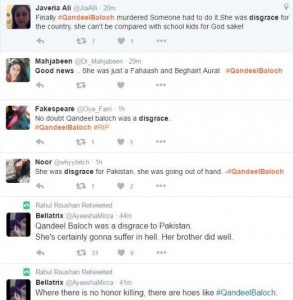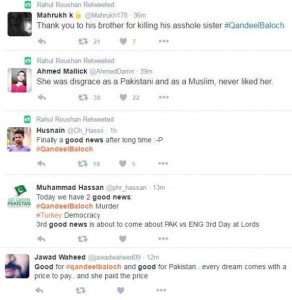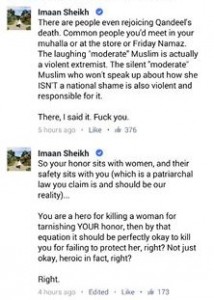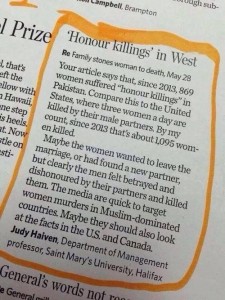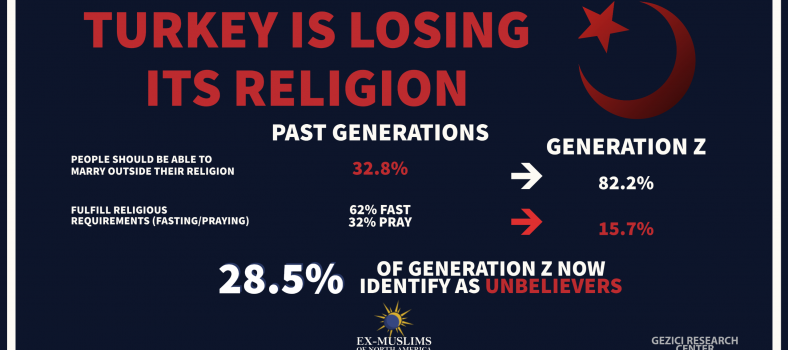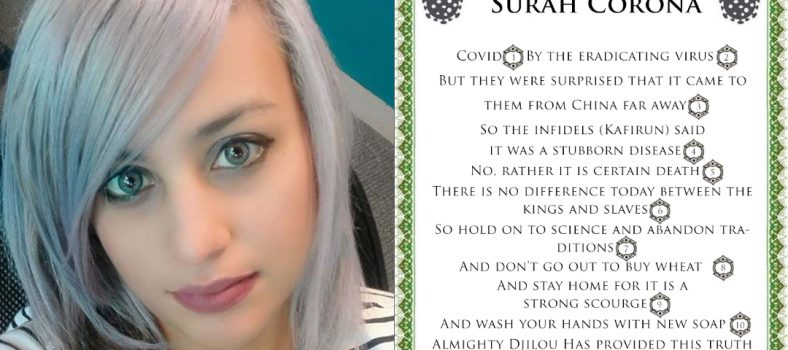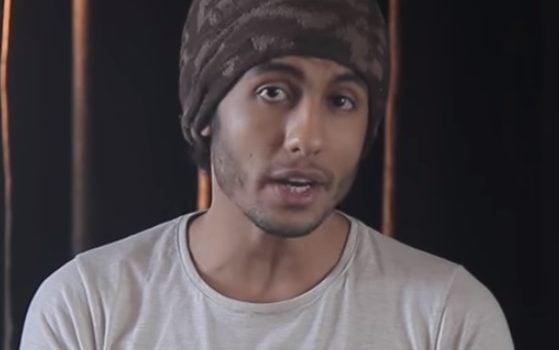Honor Violence, Qandeel Baloch, and the Straw that Broke my Heart
Rest in Power, Qandeel Baloch, murdered by your own brother in the name of honor.
How much is enough before it’s taken seriously, the idea that modesty/purity culture is dangerous and deadly to women?
How much honor violence will yet be explained away and ignored and overlooked? How much of it is obscured already, when not committed against the person of a very public figure?
Make no mistake that I could have very easily shared Qandeel Baloch’s fate once, except you’d not have heard of what was done to me.
I may yet. If I can’t keep running from the men in my family forever.
I feel sick. Are you reeling sick from this too? Tell me anybody cares how brown women are treated by the men in their communities and families.
Tell me anybody cares because it rarely feels like it. Tell me anybody cares. Tell me anybody cares.
I’m so angry. hopeless. tired. Too wrung out at core to have grief with any sense, grief that isn’t destructive and violent itself. This rages through my body and mind uncontrolled and I can’t stop or temper it.
It’s not even this one thing. It’s everything. It’s the thousands of things. I thought I was dead inside before. that my heart broke fully already. It’s not even this one thing. It just builds and builds, tearing everything inside us down.
Let me tell you about honor. This specter. Do you understand what honor is, how it’s wielded and used, why?
Do you understand. I don’t. But does it matter? It still dictates everything.
Every day of our lives, our bodies punished for honor, policed for honor, shamed for honor, restricted violenced in the explicit name of honor,
honor on every mind, honor cited and used to excuse and permit atrocities at every turn, honor held untouchable and holy over the broken bodies of women, children, and queer folks.
The honor of every man in our families held between our thighs, granting them the right to avenge their whole tribe should we sully their honor with what we do with our bodies.
Honor reigns. Honor kills.
They celebrate her death, Qandeel Baloch.
Or condemn her murder while in the same breath condemning her person in death.
They demean, degrade, decry her ‘immodest’ conduct, the same conduct she was murdered for, while being careful to say that she oughtn’t to have been killed for it, though.
Listen. Listen, though. It’s not about these people above that you see, you see?
While I’m glad that people are passing around these screenshots, displaying this callous celebration of her death, I fear this too will be made to be about the individual conduct of some horrible people, instead of taken as a representative sliver of a gargantuan problem.
What is most grieving is the sheer scale of this.
Her videos and photos on social media have literally thousands of death and rape threats in the comments. A bare two weeks before her death she publicly asked for security and protection from Pakistani Interior Minister Chaudhry Nisar because of these staggering death threats.
And now she is dead.
Really look at the #QandeelBaloch hashtag or go to her most recent posts on the Qandeel Baloch official Facebook page and you can’t count or stomach how many are condemning her in death and celebrating her murder. And that’s what we see, in English. What is being said and its scale on non-English local Pakistani twitter/social media is invisible to us outsiders too.
The problem transcends anything manageable by condemning or reporting individuals. These sentiments, they are reflections, symptoms of the larger problem.
Like the thousands gathering in sickening glee to celebrate the Orlando murders on Arab social media, too, reflected the larger sensibilities of the Arab Muslim world re: queer folks.
And I thought my heart had fully broken then.
But they will never stop, will they. These too many examples to count.
Imaan Sheikh‘s words here are too much truth to hide in the comments of a facebook thread:
Can you believe how strong she was? Qandeel Baloch? It’s too late. She was so strong, but did it matter.
Did it matter how fiercely and independently she defended herself, her rights? How candidly she spoke about the everyday horrors of the women of our world?
Did it matter, when Qandeel said:
“I was 17 years old when my parents forced an uneducated man on me. The abuse I have been through… It happens in places like this, in small villages, in Baloch families. This happened to me too. I said, ‘No, I don’t want to spend my life this way’. I was not made for this. It was my wish since I was a child to become something, to be able to stand on my own two feet, to do something for myself….What do you think will happen in a forced marriage? With an uneducated man, an animal. What would I say, that I am already married? Why would I say it? I never accepted him as my husband in my heart or mind. How I spent a year and a half with him, only I know. And I only did it because of the child. Otherwise I wouldn’t have spent even one month with him.”
You might not fathom how brave this is. I do.
Then they asked why she called him an animal. Qandeel said:
He is. The kind of torture he has inflicted on me, you can’t even imagine. Why? Because I was cute, I was young. He was older than me…Then I had a child, so I sacrificed. I spent a year and a half with him. After the child, I told him I want to study. I want to complete my education, I want to get a job, I want to stand on my own two feet. But he never agreed. My family never supported me. I would say I don’t want to live with him, but they didn’t support me.
That man tried to throw acid on me. He said ‘I’ll burn your face because you’re so beautiful’. And today the media isn’t giving me any credit for speaking about empowerment of women, girl power.
“Nobody gives me any credit,” she said.
How right she was.
It’s a difficult thing, it seems, for people who care about violence against women, to fully acknowledge and understand how damning and real a force honor is in our lives.
I remembered this today:
I couldn’t help remembering it, in a way. This treacherous erasure of the damning force of honor, like it’s not really a thing, this near-tangible social currency deemed more precious than any woman’s body, blood, life.
This gross, well meaning ignorance, trying to conflate and reduce what needs to be crucially outlined instead. As if only scale and not the nature and mechanism of violence against women matters. As if it’s irrelevant that most of the violence done to us is by fathers and brothers and uncles, often as conspiracy, collusion, in the name of family honor, as if that is not essentially different than partner violence in the West. I can’t get this out of my head today.
And to deny it– to strip us of the language used to justify violence against us our whole lives when we try to label it for what it is– to try to PROTECT US from some ill-conceived double standard?
we who’ve lived with honor held over our heads at every turn. Honor naming us as shame, honor sanctifying our spilled blood–
#QandeelBaloch and the thousand invisible women for every Qandeel Baloch you hear about, all of them, all of us
(you only hear about the deaths if at all don’t you? Who counts the beatings blackmails mutilations disownings imprisonments sexual enslavements endured in the name of honor)
Anyone who denies the signifier of honor crime as meaningful denies our bodies voices plights.
And I will never forget it. Or forgive it.
Never.
It’s so difficult to express how remarkable Qandeel’s bold embrace of her bodily and personal autonomy in face of such a heavily honor-based society.
I would tremble to think of doing what she did, were I still back in my home country, where things are so similar.
Her resilience and fortitude have me in awe.
Qandeel, her name, light, lantern, guidance, in Arabic, subsumed via Arab Islamic imperialism to the Muslim cultures of South Asia, perhaps meaning something else for them now, there,
but to me, still Qandeel, قنديل , lantern in this dark.
Imaan Sheikh again has words where my own fail:
She was also a hero, just not one us lot understood or deserved. Only because sexually liberated women cannot be our heroes. In fact, women who manage to stay alive can just not be our heroes, period.
A fully covered Malala, a child, wasn’t a hero only because she lived and worked on managing to live. Had she died she could have been a hero but she lived so she’s a ghaddaar drama bitch.
Qandeel escaped an abusive marriage as a teen, she spoke about the patriarchy, she helped her sister get wed off, she exposed the hypocrisy of mullahs, and she stood bravely in the face of bloodthirsty dogs every single day online.
It’s okay, at most sad, if a man strips you, but don’t you dare strip out of your own agency. It’s awful if your nude photos leak, but don’t you dare put them up out of your own agency.
She was a hero to me then and a hero to me now.
It’s a funny thing to think about, this question of honor.
And what kind of person do you have to be, for your honor to depend on your family members conforming to a restrictive standard of behavior?
This question of honor. And individuals. And anger and and shame and fear. What kind of human do you have to be
Perhaps, the kind of human who lives in a society where the standing and reputation of your family– its honor– dictates just about every measure of accessibility and livelihood.
A human who lives in a society where a tarnished family name can mean not being able to marry, get a job, support your family, be accepted in the community. Where sexual purity matters because it means being able to get your girls settled and cared for when they grow up, means being able to have comfortable, respected lives and futures.
(In the damningly narrow sense that encompasses home and progeny and food and clothing, but not bodily autonomy, not safety from marital rape, control, abuse?)
A human who lives in a society where the difference between prosperity and total ruin rests on its honor, where a tarnished family name must be restored by removing the source of tarnishing in order to maintain its status, and thus its livelihood.
(Except the source of tarnishing is the body, person, hopes, dreams, agency, will, of this woman here, this child there, this gay man here…these humans, these people. These people. )
A human who lives in a society where individualism is not sustainable and everything is accessed through the community. Where, whether they like it or not, the main social unit is not the individual, but the family, and the conduct of its individuals does effectively bear on the rest of the family, whether it should or not, whether they like it or not, whether they want it or not.
A human who lives in a society where individuals are disposable for the greater good of preserving the family’s status.
(And violence, control, abuse, to live essentially as property that should be grateful to be claimed and kept with a home and family– that is the tax women must pay for existing. To carry the rest of the community forward. Oh.)
We’re not talking about honor as a personal feeling people have. This is no abstract principle. We’re talking about honor as a social currency threaded into every meaningful thing, valued so highly that exemptions for crimes of honor are written into penal codes, that convicted rapists are exonerated if they restore their victim’s family honor by marrying her after she’s been ‘ruined’– because the crime wasn’t against her body, her person, but her family’s honor.
You see?
It’s not about any individual. Was it ever?
It’s about hinging the functioning of an entire society on the standing of its families, and hinging the standing of its families on the individual conduct of its members, with honorable conduct tied fundamentally to sexuality, shame, what one does with one’s body that is the property of the collective, and never one’s own.
And do we have to keep dying, publicly like this, invisibly in hoardes, for all this truth about honor and modesty and purity, inhered in these particularly Muslim values, to come out? To be permitted to talk about where all this comes from, how it works, why it is killing us?
And how much it is ignored, how little acknowledge, how scarce and meager and misguided the help?
Are you ready to listen to that conversation yet? Are you ready to listen?
It is funny how nobody raised a single voice when I was married as a juvenile at the age of 17, it is funny how nobody cared about me when I was divorced and had to starve with my hunger, when I had to give up on my son as I could not afford his medical treatment. Nobody cared. If you cannot acknowledge that despite being so much under privileged and unknown, I stood out and became an entertainer, then you have no right to mourn upon my death because I hate cowards, I hate those who close women behind bars of their obsolete mentality.Dreams don’t mean twerking on TV, it means to be free and taking decisions at your own free will. I’m not being murdered by some man named Waseem, apparently my brother, I’m being killed by the people who suffocated my dreams. Ladies and gentlemen, if you wish to judge me, judge all you want but all I have to say is each time a dream dies you’ll see a Qandeel Baloch being born.
Rest in power, Qandeel.
It may be broken, but you have my heart.
Always.


